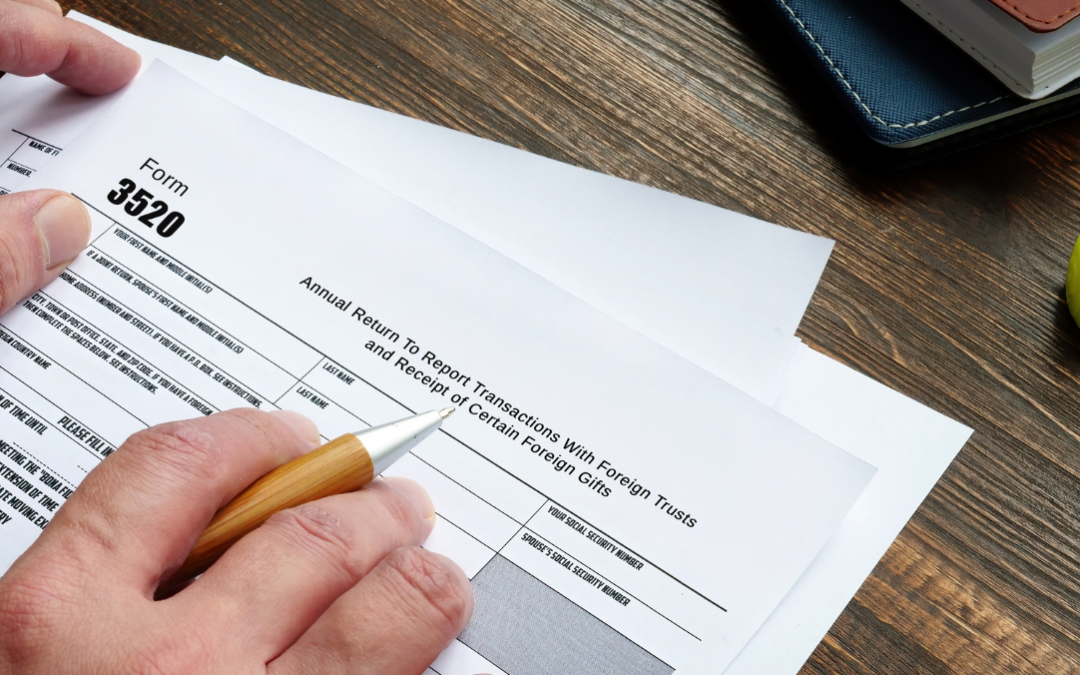In this increasingly global world, many of us are finding ourselves caught in the complexities of tax reporting related to income or assets that are held outside of the United States.
Taxpayers who receive a gift or bequest (inheritance) from a nonresident alien or foreign estate may be required to file informational Form 3520. This form also reports transactions with and distributions from foreign trusts. However, we will focus on gifts and inheritances received by US individuals.
Since this form is filed separately from your income tax return (and doesn’t result in any tax owed or refund due), it isn’t a supported form within Intuit TurboTax. Many taxpayers will be able to tackle this form on their own if they have gifts and bequests (inheritances).
Note: We do recommend consulting with a tax professional to help ensure you are aware of all of your reporting requirements, as penalties for many informational forms can be quite steep.
Who is required to file Form 3520?
US persons (citizens, resident aliens, and residents for tax purposes) must file Form 3520 to report gifts and inheritances received from foreign individuals (also known as nonresident aliens) and foreign estates.
How do I complete this form?
When reporting only gifts and bequests, taxpayers must complete the top of the form through line 1k (for items that apply). Then, skip to Part IV, question 54 on page 6. In column (a), indicate the date the gift was received.
For inheritances, the laws where the inherited property is located will determine when you are the legal owner or in “constructive receipt” of the property. This governs if you report your inheritance on the date of death or the date of the actual transfer of the property or assets.
If in doubt, and the two events occur in separate tax years, report at the date of death to avoid the potential for late-filing penalties. You may also file the form again in the year the assets are actually transferred to provide additional details or to update values, though generally, the repetition isn’t necessary.
In column (b) you list a description of what is received. This doesn’t need to be elaborate. For example, you might list “residential property in City, Province, Country” or “cash/wire transfer,” or “stocks in foreign brokerage account” or any other description that helps you to identify the item.
Column (c) is for the Fair Market Value (FMV) of the property received. In the case of assets that may typically be valued by an appraisal, where an appraisal isn’t available, use your best efforts to determine the value. It’s always better to overestimate the value here when uncertain. There’s no tax associated with these values. (The value to be used should correspond to the date of the transfer of the asset. This could be the date of death of the decedent or the date of the legal transfer of the asset or some other date as determined by the the law where the asset is located.)
When is Form 3520 due?
Form 3520 is filed in the year that a gift or inheritance is received, and is generally due on the same dates as the filer’s income tax return (April 15, June 15 for US taxpayers living overseas, or October 15 if an extension is granted).
Where is the form filed?
Although due at the same time as the individual’s income tax return, Form 3520 is filed separately and can’t be filed electronically.
If you are a taxpayer who files on June 15 because you live outside of theteh United States or Puerto Rico, attach a statement to your tax return indicating that you are subject to an automatic two-month extension because you are a US citizen (or resident) who resides outside of the United States or Puerto Rico or you are a member of the military stationed outside of the US or PR. Be sure to sign your attached statement.
The form should be printed, signed, and mailed to:
Internal Revenue Service
P.O. Box 409101
Odgen, UT 84409
FAQ:
- I am a dual citizen, and so is my mother. She lived in Italy at the time of her death, and I inherited property that is located there in addition to cash and jewelry. Since she is also a US citizen, do I need to file this form? Yes, you will need to file this form since the estate is located outside the United States. While you are receiving assets from another US citizen, those assets will be distributed outside of a US-governed estate and must be reported to the IRS.
- My father passed away two years ago, and I inherited a home. I filed Form 3520 then and have now sold the home. Do I file the form again to report the cash from the sale? No, you don’t report the cash as a separate gift on Form 3520. However, you will likely need to report the gain (or loss) from the sale of the home on your income tax return (Form 1040).
- I wasn’t aware that I was supposed to file this form last year, and now I’m late. What do I do? Late-filing penalties may be waived in cases where the taxpayer can show “reasonable cause” for the delayed filing. We recommend that you consult with a tax professional in your area familiar with the process for requesting a reasonable cause waiver for this form.
- My parents pay my tuition in the US and provide money for my support (room, board, transportation, etc.), which exceeds $100,000 USD. Does this form apply to me? Maybe. Many students are also considered nonresident aliens, and this form isn’t required for non-US persons living in the US. Also, payments made directly to universities for tuition aren’t reportable on Form 3520. However, if you are a US citizen, resident alien, or tax resident (you have qualified based on the substantial presence test) and the funds are transferred directly to you, you may be required to file this form. If you’re not certain, consult a tax professional in your area for guidance.
- I received gifts from multiple sources abroad. No individual gave me more than $100,000 but the total of my gifts for the year was greater than $100,000. Do I have to file this form? Yes. You must aggregate all assets received in a calendar year from foreign individuals and estates.
- Do I need to attach copies of statements, appraisals, sales contracts, etc. to my Form 3520? No, you don’t need to attach statements to your Form 3520 when reporting gifts and bequests. Keep these with your records, making sure to keep them easily accessible for not less than three years.
- I mailed in my Form 3520 and realized that I forgot to include an asset. What do I do? You can file an amended version of your form. Simply re-enter the data on the first page, add the asset in Section IV; write “AMENDED” across the very top of page one, and mail to the same address where you filed the initial form.
Additional notes: Depending on the assets received, the recipient may also have other filing requirements such as FBAR/FinCEN 114, Form 720, Form 8938, Form 8621, or others. These instructions aren’t applicable to transactions between a US person and a foreign trust and don’t cover all tax situations. Late-filing penalties for failure to timely report foreign gifts and bequests may be applied at the rate of 5% of the unreported value per month, not to exceed 25%. Taxpayers are encouraged to consult with a tax professional with expertise in this area before filing their tax returns.









